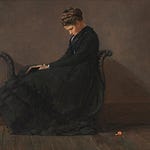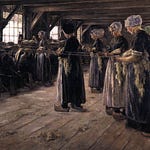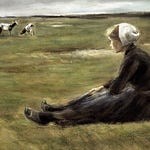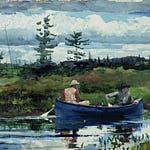I propose that the shift from parent to entertainer has been of little benefit to our children. I’m not that old that I think all parents are raising their kids by running them from class to class, screen to screen, event to event, but there most definitely has been a shift in the collective view of child rearing. To be bored has been transformed from “well then do something” to a quasi-medical emergency. As if a child’s boredom is something for a parent to fix. In fact, boredom is a wonderful opportunity. It’s a launchpad into all sorts of unexplored universes just waiting for the child’s creative mind to find them.
I see the theft of children’s imaginations as one of the great tragedies of the screen generations. Where once lived silence and stillness, both necessary components in creation, there are now space fillers. Empty junk to keep a mind full, but hungry. Sound familiar? Yes, we do it with our nutrition, too. Also with our understanding of our place, our connection to the earth, our Creator, our clothes and homes… I could go on. Let’s stick with imagination which is, after all, the bloom that grows out of a field without added weed pressure.
When our children were small, an “I’m bored” would get a curt “Well, what are you going to do about it?” There are many things a parent must do in a day to keep their little ones well loved and nourished and thriving. Entertaining happens, of course, but it’s not one of those tasks. In fact, I think we’re robbing our children of learning how to create and problem solve and trouble shoot when their only access to play is via structures and “realities” imposed by adults. I could never come up with some of the crazy games and pretend worlds that my children did. Their pretend worlds were unencumbered by social norms and good manners. They could be witches with drawn warts on their noses and draw whole villages of chalk on the driveway where each building housed a different person - the snarly baker or the timid stable hand. They created magical shields out of towels and became open water mermaids in the lakes. Nothing was out of reach of their imaginations.
Allowing our kids to enter into these wondrous, mythical lands of their minds goes far beyond entertainment. When we learn to play, to be playful, with ideas, we enter into adulthood with that power-packed mind. That mind becomes an ally in the creation of our worlds in very real ways. Not only to serve us in developing ideas in any given moment, but in bigger, overarching themes of one’s life. I know for certain that I would not be where I am, with the great love that I have, had I not been able to imagine it and then feel it and then know it.
I’ve witnessed the power of imagination in our children’s lives in endless examples. There is no option to conform to the offerings of society when your mind can come up with so many better ways to be. Why take that 9-5 when you can come up with 147 other things you would prefer to do instead? With our imaginations, we create. And through creation we learn to be flexible, to dance with outcomes and shift and pivot when necessary. Anyone can build a fort, but what do you do when Mommy the Troll or Daddy the Dragon come and demand you feed them your nose? You better think fast, little one.
And that brings me to the parenting part of imagination. Be silly dear humans of the adult persuasion! When did everyone get so serious? I am blown away by how bloody serious we’ve all gotten! It’s okay to be silly. I’d say I regularly cross over into nutty-ville, even still. When we can demonstrate play and silliness and our own imaginations, we enter into a world not governed by the regular mom and dad stuff. We enter into their world where “reality” does not rule. And how else does a mind learn to think outside of the context of what is offered as “fact” or “real”?
When our eldest daughter was just a sprout, I bought her a book called, “Red is Best”. In it is a story of a little girl named “Kelly” that just looooves the colour red. Throughout the book, Kelly laments that her mom just doesn’t understand her love for red. Her mom uses logic to persuade Kelly to, let’s say, wear her black boots in the rain because they’ll keep her feet dry, but Kelly knows that her red boots help her jump higher in puddles. Something like that, you get the idea. When I would read that story to our daughter, I would, as any narrator worth their salt must, make a special voice for the little girl, Kelly. I can still remember reading that story, again and again and again, with my little girl on my lap looking up at me, not the book at all, while I read. At one point she said, while staring longingly into my eyes, “Kelly, what other things do you like that are red?”
Well, of course, “Kelly” looked right back at her, closed the book and said, “Steak and my favourite red marble and Clifford the Big Red Dog and poppies.” And that was it. Kelly left the pages of that book and became an imaginary friend for our daughter. Sometimes when we would be having a bubble bath or a picnic outside on a blanket she would say, “Kelly, what did you do today?” Or she would ask “Kelly, do you want to play lego with me?” There was a time when I wondered if Imaginary Kelly was going to do everlasting damage, but she turned out to be a pal that my daughter could work through some things with and be silly with.
As the years went on, and another kiddo came into the world and then another, my cast of characters grew. There were all sorts of alter personalities I was called on to become. I was “Shoofly Pie” a lovely, robust woman from the South. I was “Rockefeller”, a little white rapper kid that was rich and annoying (yeah, that was fun to make raps up on demand). I was so many different characters I forget half of them. But those different play people were just some of the things we would do. We planted a sunflower jungle and carved out a hollow centre to tell secrets in where no other goblin or human could penetrate the magic of the sunflower stalks. I put on orchestral music and my three little ones would crawl up on my lap while I made up stories to go with the pace and feel of the music. Great giants would rise from the crevices between the earth to rampage the villagers at night as the thunderous drums pounded. I remember them still getting tears in their eyes, or clutching my neck as the great battles began.
I don’t think our dining room table was available for the first five years of their lives. There were houses under there. Stores and teashops and gingerbread houses. They went outside and married ants and climbed trees that became pirate ships on the choppy seas. I could write endlessly of the things they came up with, but it’s how they came up with these things in the first place. There was a need they wanted to fill. They were bored. They would lie on the kitchen floor while I was cooking and wiggle around lamenting their boredom. They’d make themselves look hopelessly sad. It was all simply too much for them! They were boooooooored. Would I not do the just and honourable thing and fix the situation? A movie perhaps? Play dolls with them, maybe? Of course I played with them sometimes, a lot of the time, but play had to be created by them.
I was recently talking to a 20 year old woman who was telling me how frustrated she is with the state of the world. I was listening to her as she described her fate, as she saw it. Her parents are paying for her to go through university. She has two years left and then she’ll have her bachelor’s degree. From there, she said, she has no choice but to do a masters. “Do you like what you’re learning?” I asked. “No, but I have to do it to get a decent job.” But, she told me, that decent job won’t even bring her in enough money to buy a house or a car or, likely, a family. That was her take on her state of affairs.
I prompted her a little bit, asked about what she loved to do, about how she could maybe see things outside of her worldview, to open up to wild possibilities and different ways to generate income and the structure of her life. And I realized at some point that I was talking a foreign language to her. I know this young woman, I know that she was raised in a beautiful, loving family. But I also know that she used to wakeup before school to go do early morning training sessions for the sports team she was on. After school, she went from language class to sports training to another sports training to a school tutor. Her whole life was structured, right down to “play groups” for socialization - a managed time slot in her life. She’s a wonderful young woman, but she has no way of knowing that the gnawing in her, that quiet instinctual voice that asks for something different, can be fed by the imaginations of a mind looking for possibilities outside of what’s on offer. She just doesn’t know her own power.
All of that play. All of those fantastical worlds and daring adventures children create, follow them into adulthood where we’re called upon to continue being co-creators in our lives. When the cookie cutters don’t serve, we can carve out our own possibilities. I see that in our daughters who have worked on farms oversees, nannied children in Europe, taught themselves how to sew and bead and draw. They’ve sold art for music band’s album covers. They’ve sewn and hand beaded beautiful lingerie. They’ve created income from their imaginations. I don’t worry about their futures. I know they have all that they need to take care of themselves and it has nothing to do with circumstance.
If we cannot imagine a world outside of the one that is held up as reality, we are doomed to be shackled to whatever is on offer. And look at what’s on offer. Institutionalized learning. Rote and repetition and the trappings of success. If what’s on offer doesn’t seem worth the effort, well there will be a universal basic income. If it’s too hard and too fruitless, well, we all know that you won’t own anything and you’ll be happy about it. An avalanche of false choices that all lead to the same destination. We are dependant when we rely on authorities and experts to give us our choices. Our choices, in truth, are limited only by the power of our imaginations.
Let them be bored. It’s amazing what they’ll come up with, now and forever.















